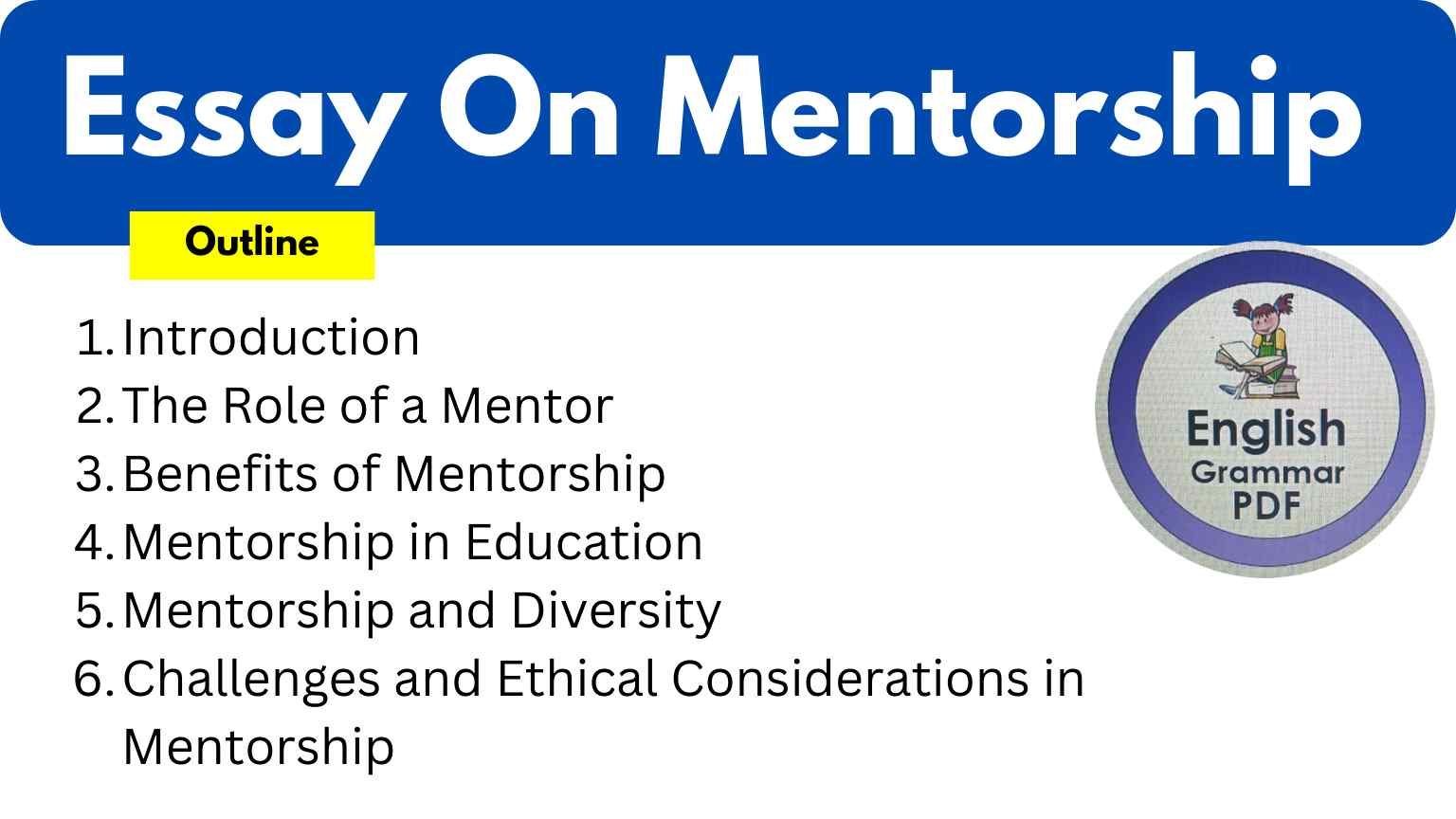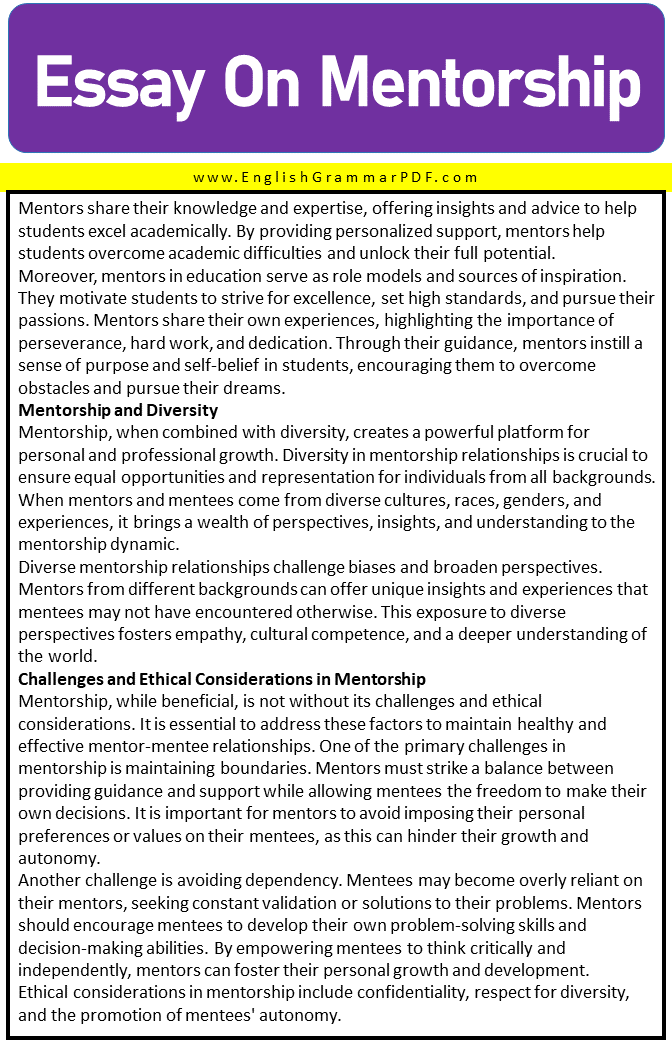Essay On Mentorship
Outline of Essay:
- Introduction
- The Role of a Mentor
- Benefits of Mentorship
- Mentorship in Education
- Mentorship and Diversity
- Challenges and Ethical Considerations in Mentorship
Introduction
Mentorship, defined as a dynamic relationship between an experienced individual (the mentor) and a less experienced individual (the mentee), plays a crucial role in personal and professional development. It serves as a powerful tool for fostering growth, guidance, and support for individuals seeking to achieve their goals. Mentorship provides a platform for knowledge transfer, skills development, and emotional support, enabling mentees to navigate their paths with confidence and resilience. This essay explores the various dimensions of mentorship, its benefits, and its impact on different areas of life.
The Role of a Mentor
The role of a mentor is pivotal in the development and success of an individual. A mentor is an experienced and knowledgeable guide who offers guidance, support, and wisdom to a less experienced individual, known as the mentee. Mentors play a multifaceted role, providing valuable insights, sharing their expertise, and acting as a role models for the mentee.
One of the primary responsibilities of a mentor is to offer guidance. Mentors help mentees navigate through various aspects of their personal or professional lives, providing advice and suggestions based on their own experiences. They offer a fresh perspective and assist mentees in making informed decisions. Mentors also act as a sounding board, patiently listening to the mentee’s ideas and concerns, and providing constructive feedback.
Furthermore, mentors are responsible for sharing their knowledge and expertise. They offer insights into their field or area of expertise, providing mentees with practical information, strategies, and resources. Mentors serve as a source of wisdom, offering valuable lessons learned from their own successes and failures. By sharing their knowledge, mentors help mentees acquire new skills and expand their understanding.
Benefits of Mentorship
Mentorship offers a wide range of benefits for both mentors and mentees. The advantages of mentorship extend across personal, professional, and emotional dimensions, contributing to the holistic development of individuals.
One of the primary benefits of mentorship is knowledge transfer and skills development. Mentees have the opportunity to learn from the expertise and experiences of their mentors, gaining valuable insights and practical knowledge that can enhance their own abilities. Mentors can pass down industry-specific knowledge, share best practices, and provide guidance on navigating challenges. This knowledge transfer empowers mentees to make informed decisions, avoid pitfalls, and accelerate their learning curve.
Personal growth and self-confidence are also significant benefits of mentorship. Mentors serve as role models, inspiring mentees to reach their full potential. Through their guidance and support, mentors help mentees discover and develop their strengths, build self-awareness, and cultivate a growth mindset. As mentees gain new skills and knowledge, their confidence grows, enabling them to take on new challenges and pursue their goals with greater conviction.
Mentorship also offers valuable networking opportunities and can contribute to career advancement. Mentors often have extensive professional networks, and they can introduce mentees to influential individuals, potential employers, or industry contacts. These connections can open doors to new opportunities, provide access to valuable resources, and enhance mentees’ visibility within their respective fields.
Emotional support and guidance are essential components of mentorship. Mentors serve as trusted confidants, providing a safe space for mentees to discuss their concerns, fears, and aspirations. They offer encouragement, advice, and perspective during difficult times, helping mentees overcome obstacles and stay motivated. The emotional support provided by mentors fosters a sense of belonging, reduces feelings of isolation, and boosts mentees’ resilience.
Mentorship in Education
Mentorship in education is a valuable practice that has a significant impact on student’s academic and personal development. Mentorship programs in schools and universities provide a platform for students to receive guidance, support, and inspiration from experienced individuals. Mentors in education play a crucial role in shaping students’ paths, helping them navigate through the challenges and complexities of their academic journey.
One of the primary roles of mentors in education is to provide academic guidance. They assist students in selecting appropriate courses, setting academic goals, and developing effective study strategies. Mentors share their knowledge and expertise, offering insights and advice to help students excel academically. By providing personalized support, mentors help students overcome academic difficulties and unlock their full potential.
Moreover, mentors in education serve as role models and sources of inspiration. They motivate students to strive for excellence, set high standards, and pursue their passions. Mentors share their own experiences, highlighting the importance of perseverance, hard work, and dedication. Through their guidance, mentors instill a sense of purpose and self-belief in students, encouraging them to overcome obstacles and pursue their dreams.
Mentorship and Diversity
Mentorship, when combined with diversity, creates a powerful platform for personal and professional growth. Diversity in mentorship relationships is crucial to ensure equal opportunities and representation for individuals from all backgrounds. When mentors and mentees come from diverse cultures, races, genders, and experiences, it brings a wealth of perspectives, insights, and understanding to the mentorship dynamic.
Diverse mentorship relationships challenge biases and broaden perspectives. Mentors from different backgrounds can offer unique insights and experiences that mentees may not have encountered otherwise. This exposure to diverse perspectives fosters empathy, cultural competence, and a deeper understanding of the world.
Challenges and Ethical Considerations in Mentorship
Mentorship, while beneficial, is not without its challenges and ethical considerations. It is essential to address these factors to maintain healthy and effective mentor-mentee relationships. One of the primary challenges in mentorship is maintaining boundaries. Mentors must strike a balance between providing guidance and support while allowing mentees the freedom to make their own decisions. It is important for mentors to avoid imposing their personal preferences or values on their mentees, as this can hinder their growth and autonomy.
Another challenge is avoiding dependency. Mentees may become overly reliant on their mentors, seeking constant validation or solutions to their problems. Mentors should encourage mentees to develop their own problem-solving skills and decision-making abilities. By empowering mentees to think critically and independently, mentors can foster their personal growth and development.
Ethical considerations in mentorship include confidentiality, respect for diversity, and the promotion of mentees’ autonomy. Mentors must maintain strict confidentiality regarding the information shared by their mentees. Respecting diversity entails recognizing and valuing the unique perspectives, backgrounds, and experiences of mentees. Mentors should avoid any form of discrimination or bias, ensuring equal opportunities for all individuals.
Furthermore, mentors must be mindful of their ethical responsibilities to promote the mentees’ autonomy and personal agency. They should guide and support mentees without imposing their own agendas or decisions. The goal is to empower mentees to make informed choices and take ownership of their development.
By acknowledging and addressing these challenges and ethical considerations, mentorship relationships can flourish, providing mentees with the support they need while respecting their individuality and fostering their personal and professional growth.
FAQ’s
What are the 3 Cs of mentorship?
The 3 C’s of mentorship are Communication, Collaboration, and Commitment. These principles emphasize the importance of effective communication between mentor and mentee, collaborative problem-solving, and a mutual commitment to the mentoring relationship.
What are the 4 key aspects of mentoring?
The 4 key aspects of mentoring are Guidance, Support, Feedback, and Role Modeling. Mentors provide guidance by sharing their knowledge and expertise, offer support to help mentees overcome challenges, provide constructive feedback to aid in development and act as role models to inspire and motivate mentees.
What are the 3 goals of the mentorship program?
Three goals for a mentorship program include knowledge transfer and skills development, where mentors share their expertise and help mentees acquire new skills; Personal growth and confidence-building, as mentors provide support and encouragement to boost mentees’ self-confidence, Networking and career advancement, where mentors offer opportunities, connections, and guidance for mentees to advance in their careers.
Download the PDF of the Essay:
Explore More Essays:







